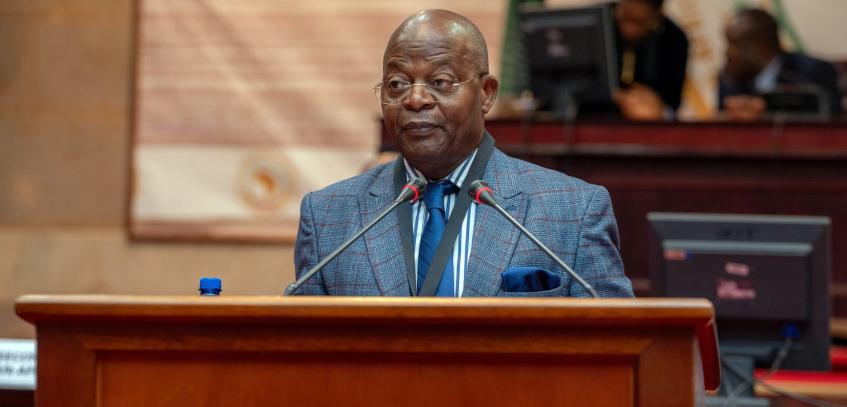The Pan-African Parliament has reaffirmed its unwavering commitment to the African Union’s 2025 Theme, “Justice for Africans and People of African Descent through Reparations” during its ongoing 5th Ordinary Session of the 6th Parliament in Midrand, South Africa. Through this session, the Parliament is taking decisive, coordinated action to advance justice, restore dignity, and drive inclusive socio-economic transformation across the continent.
During the session, Hon. José Manteigas Gabriel, Pan-African Parliament Committee on Justice and Human Rights Rapporteur, led a comprehensive report adopted by consensus of the Pan-African Parliament. Hon. Gabriel noted that the 2025 theme seeks to address the historic injustices of colonialism, slavery, and structural racism, which continue to underpin Africa’s wealth disparities and marginalisation.
“Reparations go beyond economic reparation to include institutional reforms, recovery of cultural artefacts, development assistance, and reforms of the educational system,” he affirmed.
Hon. Gabriel emphasised the Pan-African Parliament’s contribution to legislating on issues of recognising historical injustices, raising global awareness, engaging with AU and international stakeholders, and distributing fair benefits among concerned people.
“The Pan-African Parliament will continue to be a voice for reparatory justice through its legislative and advocacy functions to drive Africa’s socio-economic renaissance under Agenda 2063 and the AU’s 2025 theme,” he reiterated.
To this, Justice Modibo Sacko, the President of the African Court on Human and Peoples’ Rights, underscored the imperative necessity of higher commitment and cooperation towards progressing in ensuring justice for Africans as a complex and ongoing process. He re-iterated the mandate of the Court as a flagship institution promoting the vision of the AU for a peaceful, united, and prosperous Africa, noting remaining challenges including low protocol ratification of the Court, acceptance of jurisdiction in limited cases, and non-enforcement of decisions.
“The time is now to ensure Africa is on the correct side of history,” Justice Sacko urged, calling on parliamentarians to enshrine human rights institutions and strive for greater conformity and cooperation across member states.
Ambassador Amr Aljowaily, Director of the African Union Commission’s Citizens and Diaspora Directorate (CIDO), reasserted the joint AU commitment to reparative justice to the diaspora and Africans in accordance with Assembly Decisions 849-931 and 934, which establish slavery, colonialism, and apartheid as crimes against humanity for which reparations are needed. He underscored AU-coordination at the system level to mainstream reparative justice across organs and member states, mobilize resources, and operationalize mechanisms like the AU Committee of Experts on Reparations.
“Reparative justice is central to building a future where Africans and their descendants thrive, free from the shackles of history, in accordance with Agenda 2063 and the vision of the AU 2025 theme of justice and regained dignity,” asserted Ambassador Aljowaily, while underlining the Pan-African Parliament’s leading role in taking forward legislation, policy, and public awareness about reparations.
African Commission on Human and Peoples’ Rights, Hon. Dr. Litha Musyimi-Ogana, ratified that reparative justice for the Africans and their diaspora constitutes a moral and historical imperative aligning with the AU 2025 theme. Based on the Durban Declaration and the Abuja Proclamation, she spoke about the Commission’s Resolution 543 condemning modern slavery and calling for national reparative mechanisms.
Hon. Dr. Musyimi-Ogana emphasised that it takes over a year of work to get reparations, urging the Pan-African Parliament to prioritise reparations in law, policy, and education.
“We must make the AU 2025 theme a promise of regained dignity, truth, and justice for generations yet to come in Africa and its diaspora across the world,” she added.
Ms. Anne Musiwa, African Committee of Experts on the Rights and Welfare of the Child (ACERWC) Rapporteur, commended the Pan-African Parliament for advancing human rights under Agenda 2063 while bringing its activities under the AU 2025 theme. Marking the 35th anniversary of the African Children’s Charter, she emphasised that reparative justice must begin with children if barriers to their rights and opportunities rooted in historic injustice are to be dismantled.
Ms. Musiwa laid out ACERWC’s actions to address child statelessness, school exclusion of pregnant and married girls, and child slavery and to demand reforms at the systemic level. “Pursuit of reparative justice must place children first under the AU 2025 theme if a just, rights-based future is to be achieved for the continent,” she said, calling upon the Pan-African Parliament to enact enabling legislation, harmonise national policies, and fund child-centered justice.
By these presentations, the Pan-African Parliament has also reaffirmed its leadership role in driving reparative justice as part of the broader African agenda for justice, human rights, and sustainable development, aligning with the Agenda 2063 vision of “The Africa We Want” and the 2025 Theme of the African Union. The session was poignant in pointing out that reparative justice is not merely an issue of restoring dignity and addressing past injustices but also a basis for building resilient, prosperous, and inclusive African societies and their diaspora.
-Ends-








